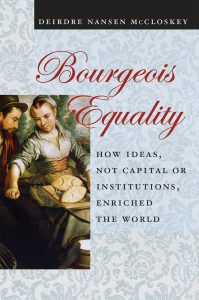5/6: Deirdre McCloskey at Seminary Co-op

From a recent profile of Deirdre McCloskey in the Chronicle of Higher Education:
As the University of Chicago Press plans to release next month the final volume of McCloskey’s ambitious trilogy arguing that bourgeois values, rather than material circumstances, catalyzed the past several centuries’ explosion in wealth, her gender change may be the least iconoclastic thing about her. A libertarian with tolerance for limited welfare interventions by government, an economist who critiques the way her colleagues apply statistics and mathematical models, a devout Christian who emphasizes charity and love but within free-market strictures, a learned humanist politically to the right of many of the scholars who inspire her, McCloskey is a school of one.
“Everybody regards her as a superb intellectual and somebody who has for many years disregarded disciplinary boundaries,” says the economic historian Joel Mokyr, of Northwestern University. . . .
“I’ve seen so many academic careers end not with a bang but with a whimper. I thought that would happen to me,” she says. “I am so glad that in my old age I have found a project that uses what talents I have.”
McCloskey’s singularity can be traced to her lifelong journeys across gender, politics, academic outlook, and religious viewpoint. She has shifted from male to female, from left to right, from narrow, math-centered economist to wide-ranging interdisciplinarian, and from secular to progressive Episcopalian. Those four strands have intertwined and influenced one another. In the experience of a lesser and less determined mind, they might have added up to flakiness or hopeless confusion. But even McCloskey’s critics tend to venerate two or three phases of her varied career, if not all of them, and the word “brilliant” comes up not infrequently.
McCloskey is wry about the changes. “I seem to be condemned to spending the second half of my career contradicting the first half,” she tells a trio of graduate students in an informal seminar at her home one evening when the rest of the country is watching the Super Bowl.
It’s a good line, but the truth is more complicated. Each stage was necessary to the next, built on the models and knowledge of the period before, but improved as she confronted her disillusionment when those models proved fallible or at least insufficient to explain the complex world around her. The shifts, some reflected over the course of her 17 books, weren’t fickle changes of mind but a pentimento layering of experience. “I think that’s true of all our lives,” she says, “don’t you?”
***
Join McCloskey for a discussion of her latest book Bourgeois Equality: How Ideas, Not Capital or Institutions, Enriched the World, Friday, May 6th, 6PM, at the Seminary Co-op Bookstore, 5751 South Woodlawn, Chicago, IL 60637.
To read more about Bourgeois Equality, click here.